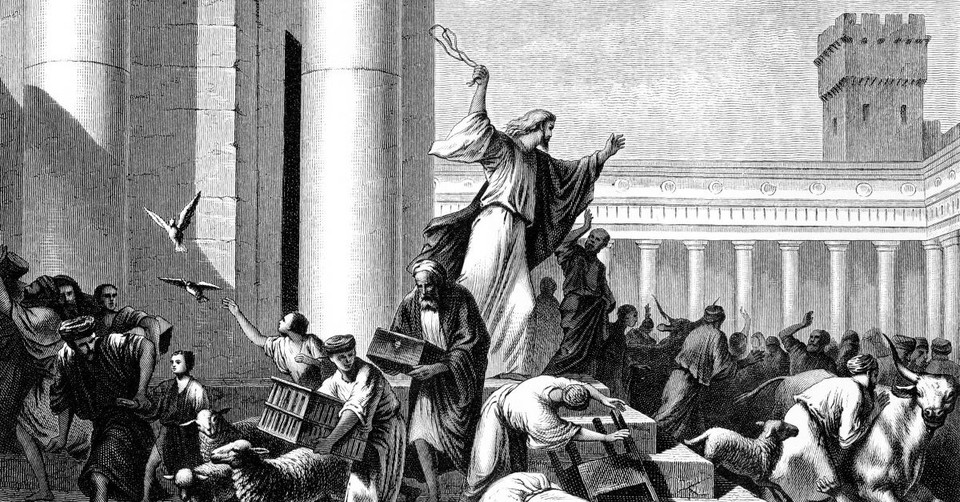3 Key Lessons from Jesus in the Temple

We have a saying around our house, “If mama ain’t happy, then nobody’s happy.” I often think of Jesus in the temple and think we need the same phrase, “If Jesus ain’t happy…” Especially when Jesus walked the earth and cleansed the temple shortly before His death and resurrection.
Then there was the first time He challenged His parents and stayed behind in the city from His family who had left to travel home. Jesus was 12 and nowhere to be found in their caravan. He definitely gave His mother a heart attack, only to stun her when she found Him sitting among the elders as He simply stated, “Didn’t you know I had to be in my Father’s house?”
In today’s world, we are divided between doctrines, masks, vaccines, personal views, how the Church should be run, and of course, political parties. Everywhere you turn, individuals have strong opinions about the Church, faith, deconstruction of faith, and so much more. The very fabric of our faith is being torn, frayed, and unraveled. But…once the feelings settle, our minds clear, and then we get quiet; we feel His presence as we pray for Jesus to come for His people and heal this broken world. We sit in the quiet and reflect on His life.
His example reveals He was more than a man and He went against the grain of society. But it’s more than that. He taught us what faith looks like in action with a heart for God, the Church, and mankind. Jesus did more than just scare his mom and drive out cheapskates. He set the standard of having a burning faith in the Church. He set the example to fight for faith, injustice and loving the lost. Here are three key lessons about faith from Jesus in the temple.
Jesus' Example of Faith
"For we walk by faith, not by sight." 2 Corinthians 5:7
Those words seem simple enough. But what does it mean? In today’s world where there is more division than ever, I am learning that fleshing out these words is more complex. Yet, at its core, it’s simple. Faith means having tremendous confidence in God. It means courage and strength. It means unending grace. It also means standing up for what is pure, true, and right. It means believing the Bible is the key to nourishing our souls and the Church is a place to shine our light—not just outside its four walls but also within. Faith means you’re willing to look like a fool, willing to be misunderstood, abandoned, and become an outcast. It also means giving up any semblance of control over your life because you know the Author of your story is still writing it, knowing He knows the outcome. Why? Because at its core, faith is believing that “we walk by faith and not by sight.”
Jesus in the Temple Bible Story
"So then, faith comes by hearing, and hearing from the Word of God." Romans 10:17
Matthew 21:12-17 and John 2:13-22 tell the story of Jesus cleansing the Temple. The two passages may have been two different instances of Jesus cleansing the Temple, but they teach similar principles. Jesus had come to be the bridge between humanity and God. Jesus came because He knew we needed a savior. Yet, the Law was standing in the way. At the time, those who wanted to be righteous knew they needed to be pardoned for their sins. The Law required a sacrifice in the form of birds, lambs, cows, and oxen. Those who went to the temple to honor the Lord and seek His pardon knew they needed to bring a blood sacrifice. This blood sacrifice meant passing their sins onto the animal. Thus, commercialism and exhorting the pour began (Exodus 30:11-16; Leviticus 14:22; Luke 2:24).
When Jesus entered the Temple, He assumed He would see people praying for needs, pardons, and finding the purest way to honor God. Instead, He saw a marketplace as a stumbling block and gate blocking humanity’s need from God. He saw corrupt, abusive, ungodly men as moneychangers, sellers of merchandise, and how others made God’s house of prayer into an abusive and lucrative place to extort those in need. At the time Jewish law was under the rule of Romans which meant “half a shekel” of Jewish coin needed to be changed into Roman coin (Exodus 30:11-16). It became a matter of convivence to have a place where Roman coins could be exchanged for Jewish coins. The moneychangers provided this convenience but would demand a fee for the money exchange. Because thousands would travel from all over for Passover and feasts, money changing became a profitable business that became a gate, blocking the oppressed and poor via fraud and exhortation.
Jesus’ first cleansing of the temple is described in John 2:11-12 as having occurred just after Jesus’ first miracle, the turning of water into wine at the wedding in Cana. The second cleansing of the temple occurred just after Jesus’ triumphal entry into Jerusalem the last week of His life. This second cleansing is recorded in Matthew, Mark, and Luke but not in John. John 2:14-15 notes, "In the temple he found those who were selling oxen and sheep and pigeons, and the money-changers sitting there. And making a whip of cords, he drove them all out of the temple.
But here is the twist in the story, this wasn’t the only time Jesus was found in the temple. In Luke 2:41-52, Jesus purposely stayed behind to be in His Father’s House. “Each year Jesus’ parents went to Jerusalem for the feast of Passover, and when he was twelve years old, they went up according to festival custom. After they had completed their days, as they were returning, the boy Jesus remained behind in Jerusalem, but his parents did not know it. Thinking that he was in the caravan, they journeyed for a day and looked for him among their relatives and acquaintances, but not finding him, they returned to Jerusalem to look for him.”
Key Lessons from Jesus in the Temple
What is it about this about finding Jesus in the temple which is of such significance? First, Jesus was already well aware of His identity and Mission. He was comfortable in His Father's House, the temple, and His teaching was already compelling. Even to the teachers in the temple at the mere age of twelve. Later, when he drove out the money changers, He was obliterating all obstacles to God. Here are the 3 lessons we can learn.
1. Jesus Was Intent on Purifying the Church
Compared to the priests and Pharisees, Jesus was bent on purifying the church.
John 2:14-16 tells us,
"And He found in the temple those who sold oxen and sheep and doves, and the money changers doing business. When He had made a whip of cords, He drove them all out of the temple, with the sheep and the oxen, and poured out the changers' money and overturned the tables. And He said to those who sold doves, "Take these things away! Do not make My Father's house a house of merchandise!""
Compared to today’s churches that are focused on growth and becoming mega-churches, Jesus cared more about why people were attending instead of how many people attended. He cared more about who was coming to the Temple instead of how many people were coming. Jesus said His house was to be a House of prayer. He wanted His people to come with the focus of connecting with God and praying to God.
2. Nothing Is More Important Than the Kingdom of God
What is the real Kingdom of God? We are. When Jesus took our place on the cross, He became the bridge between us and God’s Kingdom. God resides within each of our hearts and someday God’s kingdom will come after He transforms the world with a new heaven and a new earth. When religious leaders asked when God’s Kingdom would be established (thinking God would wipe out the Romans who were ruling over them at the time). In Luke 17:20-21 Jesus “answered them and said, ‘The kingdom of God does not come with observation; nor will they say, “See here!” or “See there!” For indeed, the kingdom of God is within you.’” Jesus declared in Matthew 6:33, “But seek first the kingdom of God and His righteousness, and all these things shall be added to you.” Instead of running after what we think we need or want, we should be pursuing God’s Kingdom, because God will take care of our wants and needs.
3. People Are More Valuable Than Money
Jesus demonstrated that people were more important and precious than profits. His righteous anger revealed His heart for His people. Jesus went on to tell the disciple the second greatest commandment as well: “You shall love your neighbor as yourself” (Matthew 22:39). The truth is we are lovers of ourselves when Jesus taught that we are to love our neighbors as much as ourselves. Jesus takes loving others even further in Luke 6:27: “But I say to you who hear: Love your enemies, do good to those who hate you.” That’s right; according to the Son of God, we’re supposed to even love our enemies!
When we apply these lessons to our lives, we can further God’s Kingdom and extend His invitation to others. We can in turn be a living Temple that shines a light in this dark world. We have the opportunity to shine His light while there is still time. In turn, our lives will be filled with His abundance of joy.
Was Jesus Justified in Overturning the Tables?
What Is Godly Anger?
“We all have things that irritate us, and we display our anger in different ways. Yet research has proven that it is not good to be angry. One study found that bad-tempered people are three times more likely to have heart attacks. And a 2006 Harvard study revealed that 10 million men in the U.S. are so angry, they are sick. In fact, their disease has a name: Intermittent Explosive Disorder (IED).
Having said all that, not all anger is bad. The Bible records a time when Jesus Christ, God incarnate, was angry. Very angry. After making His triumphal entry into Jerusalem with crowds cheering and palm branches waving, Jesus "went into the temple and began to drive out those who bought and sold in it, saying to them, ‘It is written, "My house is a house of prayer," but you have made it a "den of thieves" ' " (Luke 19:45-46).
Was Jesus having a temper tantrum? Hardly. It was righteous indignation. He went into the temple. He took stock of the situation. And He overturned tables. Why such a display of anger? Because the people engaged in temple commerce were keeping others from God. They had a little racket going in which they found fault with the sacrificial animals the people brought in and then sold them an "approved" animal at an inflated price. And this made Jesus angry.
God is angry when people stand in the way of sinners coming to know Him. God doesn't like it when we get in the way, and it happens all too often in the church. But the church is not supposed to be a museum for saints; it is supposed to be a hospital for sinners—a place for people to know God.”
- Taken from "When Jesus Got Angry" written by Greg Laurie, distributed by Harvest Ministries (used by permission).
Photo Credit: ©GettyImages/wynnter

Learn more about the meaning and significance behind the Easter holiday and Holy Week celebrations:
What is Lent? and When Does Lent Start?
What is Ash Wednesday? and When is Ash Wednesday?
What is Palm Sunday?
What is Maundy Thursday?
What is Good Friday? and When is Good Friday?
What is Holy Saturday?
What is Easter? and When is Easter Sunday?
Easter Bible Verses
The Resurrection of Jesus
Easter Prayers

Originally published February 18, 2022.




